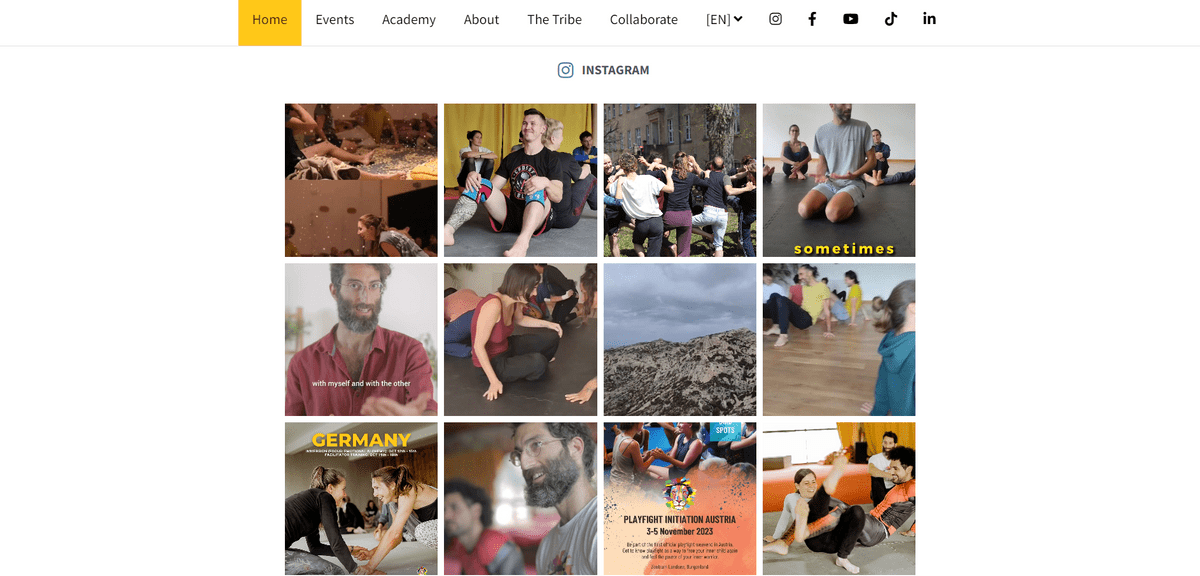Supercharge Your Marketing With A Social Media Campaign
Supercharge Your Marketing With A Social Media Campaign

With billions of people using social media platforms, it has become a crucial tool for businesses to reach and engage with their target audience. Whether you are a small startup or a well-established brand, supercharging your marketing efforts through social media campaigns is essential for staying relevant and competitive in the market.
What is Social Media Campaign
A social media campaign is a coordinated marketing effort that utilizes various social media platforms to achieve specific goals and objectives. It involves creating and sharing content tailored to resonate with the target audience, driving engagement, brand awareness, and conversions. By leveraging social media's vast reach and influence, businesses can amplify their message and connect with their customers more personally.
Why You Need to Supercharge Your Marketing
There must be more than traditional marketing methods to cut through the noise in today's crowded marketplace. Consumers increasingly turn to social media as their primary source of information and entertainment, making it an indispensable platform for businesses to connect with their audience. By supercharging your marketing efforts through learning how to create a social media campaigns, you can tap into this vast pool of potential customers and drive meaningful results for your business.
Harnessing the Potential of Social Media
Social media platforms offer unique opportunities for businesses to engage with their target audience in ways that were impossible before. Through strategic planning and execution, companies can harness the potential of social media to build brand loyalty, increase website traffic, generate leads, drive sales, and create lasting relationships with customers. With the right approach, a well-crafted social media campaign can propel your business towards success.
Understanding What is Social Media Campaign
A social media campaign is a coordinated marketing effort that utilizes various social media platforms to promote a specific message, product, or service. Mastering how to create a social media campaign involves creating and sharing content to engage and reach a target audience.
Critical elements of a successful social media campaign include:
- Clear goals and objectives.
- Well-defined target audience analysis.
- Selecting the right social media platforms to reach that audience effectively.
Creating engaging content, utilizing visuals and multimedia, and incorporating user-generated content are essential for building a social media campaign.
Implementing a social media campaign offers several benefits:
- It allows businesses to increase brand awareness by reaching a wider audience through social media.
- It helps drive traffic to websites or landing pages, leading to potential conversions and sales.
- It enables businesses to build strong customer relationships by engaging directly through comments, likes, shares, and messages.
1. Identify Your Goals
Mastering how to create a social media campaign requires careful planning and strategic thinking. It starts with identifying your goals and objectives – increasing brand awareness or driving sales – as this will guide your entire campaign strategy. Conducting a thorough target audience analysis is crucial in understanding who your ideal customers are and how to tailor your content specifically for them.
Selecting the right social media platforms is equally essential, as different platforms attract different demographics. For example, if your target audience consists mainly of young adults or teenagers, platforms like Instagram or TikTok may be more effective than LinkedIn or Twitter.
Building a social media campaign involves creating engaging content that resonates with your target audience. This can be done by telling captivating stories about your brand or product and offering valuable information or tips that solve or entertain their problems.
Utilizing visuals and multimedia such as images, videos, and infographics can make your content more visually appealing and shareable on social media platforms. Incorporating user-generated content like testimonials or reviews from satisfied customers can also add authenticity and credibility to your campaign.
3. Monitor Your Campaigns
Implementing and monitoring your campaign is crucial to ensuring its success. This involves scheduling and publishing content consistently, engaging with your audience by promptly responding to comments or messages, and analyzing metrics such as reach, engagement, and conversions. Regularly monitoring these metrics can adjust your campaign strategy if needed.
Strikingly used social media platforms like Facebook, Instagram, and Twitter to showcase their website-building services. They created engaging content highlighting their platform's benefits and encouraged user-generated content by sharing customer success stories. As a result, they increased brand awareness and attracted more users to their platform.
4. Do Collaboration
To maximize the impact of your social media campaign, consider collaborating with influencers who have a large following in your target audience. Their endorsement can significantly boost the reach and credibility of your campaign. Additionally, leveraging paid social media advertising allows you to target specific demographics or interests effectively.
Creating a sense of urgency in your campaigns by offering limited-time promotions or exclusive deals can also encourage immediate action from your audience.
Social media campaigns can supercharge your marketing efforts by reaching a wider audience, driving traffic and conversions, and building strong customer relationships. By understanding the critical elements of a successful campaign and implementing strategic planning, businesses can easily master how to create a social media campaign that resonate with their target audience. Start building a social media campaign today!
Crafting a Strategic Plan
Image taken from Local Wander
Crafting a strategic plan is crucial to create a social media campaign. This section will guide you through identifying your goals and objectives, conducting a target audience analysis, and selecting the right social media platforms to maximize your campaign's impact.
1. Identifying Your Goals and Objectives
The first step in crafting a strategic social media campaign plan is clearly identifying your goals and objectives. What do you hope to achieve through this campaign? Whether it's increasing brand awareness, driving website traffic, or generating leads, having specific goals in mind will help shape your entire campaign strategy.
To create a social media campaign, set SMART goals - Specific, Measurable, Achievable, Relevant, and Time-bound. For example, instead of saying increase brand awareness, a SMART goal could be to increase brand mentions on social media by 20% within three months.
By clearly defining your goals and objectives from the start, you can align all aspects of your campaign toward achieving them.
2. Target Audience Analysis
Understanding your target audience is essential to create a social media campaign. Conducting thorough research on their demographics, interests, behaviors, and pain points will enable you to tailor your messaging and content to their needs.
Start by creating buyer personas that represent different segments of your target audience. These personas should include details such as age range, gender, location, occupation, hobbies/interests, and challenges they face that your product or service can solve.
By understanding who your audience is and what they care about most, you can create content that resonates with them on a deeper level.
3. Selecting the Right Social Media Platforms
Once you have identified your goals and analyzed your target audience, it's time to select the right social media platforms for your campaign. Different platforms attract different audiences with varying preferences for content consumption.
Consider each platform's demographics and user behavior before deciding where to focus your efforts. For example, LinkedIn might be a more suitable platform than Instagram if your target audience consists mainly of professionals.
Additionally, consider the type of content you plan to create. If your campaign heavily relies on visuals, platforms like Instagram and Pinterest are great choices. On the other hand, if you want to share long-form content or engage in discussions, platforms like Facebook or Twitter may be more appropriate.
By carefully selecting the right social media platforms for your campaign, you can ensure that your message reaches the right audience most effectively.
Building a Social Media Campaign
Image taken from Hollabox
1. Creating Engaging Content
One of the critical elements in building a social media campaign is creating engaging content. Your content should be compelling, informative, and relevant to your target audience. It should grab their attention and encourage them to take action. To create engaging content:
- Focus on storytelling, using relatable examples and personal anecdotes that resonate with your audience.
- Incorporate humor, emotion, or controversy to spark interest and encourage sharing.
- Remember to keep your content concise and easily digestible for social media platforms.
2. Utilizing Visuals and Multimedia
In addition to engaging written content, incorporating visuals and multimedia into your social media campaign can significantly enhance its impact. Visuals such as images, videos, infographics, or GIFs can capture attention and convey messages quickly. Users are more likely to share and remember them than plain text posts. When selecting visuals for your campaign, ensure they are high-quality, relevant to your message, and align with your brand's aesthetics.
3. Incorporating User-Generated Content
User-generated content (UGC) is another powerful tool in building a social media campaign. UGC refers to any content created by users or customers that promotes or relates to your brand or products. Incorporating UGC into your campaign increases engagement and builds trust and authenticity around your brand. Encourage users to share their experiences with your products or services through hashtags or contests. Reposting UGC can also strengthen the bond between your brand and its community.
You can significantly increase its impact and success by creating engaging content, utilizing visuals and multimedia, and incorporating user-generated content into your social media campaign strategy. Strikingly, a website builder platform is an excellent example of a brand that has successfully utilized these tactics to build a solid online presence and engage with its audience.
Building a social media campaign requires careful planning and continuous monitoring. In the next section, we will discuss the implementation and monitoring of your campaign to ensure its effectiveness.
Implementing and Monitoring Your Campaign
Image taken from Playfight
Implementing and monitoring your social media campaign is crucial for its success. Here are three key steps to follow:
1. Scheduling and Publishing Content
Planning and scheduling your content in advance is essential to execute your campaign effectively. This ensures consistency and allows you to maintain a steady flow of engaging posts. Use a social media management tool to schedule your content across different platforms, such as Facebook, Instagram, Twitter, and LinkedIn.
Remember to tailor your content for each platform, considering the preferences and behaviors of your target audience on each channel. Use captivating headlines, compelling visuals, and concise captions to grab attention and encourage engagement.
2. Engaging with Your Audience
Engagement is the heart of any successful social media campaign. Actively respond to your audience's comments, messages, and mentions to foster a sense of connection and build relationships. Promptly address any questions or concerns raised by users.
Encourage user-generated content by running contests or asking for opinions on relevant topics. This not only increases engagement but also helps in creating a sense of community around your brand.
3. Analyzing Metrics and Making Adjustments
Regularly monitor the performance of your social media campaign using analytics tools provided by each platform or third-party software like Google Analytics or Sprout Social. Pay attention to metrics such as reach, impressions, engagement rate, click-through rate (CTR), conversions, and return on investment (ROI).
Analyze these metrics to gain insights into what works well and what needs improvement. Adjust your strategy by optimizing underperforming posts or ads, experimenting with different content formats or posting times, or reallocating resources based on the platforms that yield the best results.
Remember that monitoring should be an ongoing process throughout your campaign. Continuously track the impact of your efforts and make data-driven decisions to ensure maximum effectiveness.
Successful Social Media Campaign Examples
Image taken from SNOBB
This section will explore three successful social media campaign examples demonstrating the power and effectiveness of utilizing social media platforms to achieve marketing goals.
1. Strikingly: A Case Study on Building a Strong Online Presence
Strikingly, a website builder platform, implemented a social media campaign to enhance its online presence and attract new users. They strategically utilized platforms such as Facebook, Instagram, and Twitter to engage with their target audience and showcase the benefits of their services.
By creating engaging content that highlighted the success stories of Strikingly users and sharing it across various social media channels, they were able to generate brand awareness and drive traffic to their website. They also incorporated user-generated content by encouraging customers to share their experiences using the hashtag #StrikinglyStories.
Through consistent posting, active engagement with followers, and analyzing metrics to make adjustments along the way, Strikingly successfully built a solid online presence through its social media campaign.
2. Nike's Just Do It Campaign: Inspiring Consumer Engagement
Nike's Do It campaign is an iconic example of how a powerful message combined with effective use of social media can inspire consumer engagement. The campaign aimed at motivating individuals to pursue their dreams and overcome obstacles by showcasing real-life stories of athletes who have triumphed against all odds.
Nike leveraged social media platforms such as YouTube, Instagram, and Twitter to share inspiring videos, images, and quotes resonating with their target audience. By encouraging users to share their stories using the hashtag #JustDoIt, Nike created a sense of community and empowered consumers to become brand advocates.
The success of Nike's Just Do It campaign can be attributed to its ability to tap into the emotions of its audience while utilizing the power of social media platforms for maximum reach and engagement.
3. Coca-Cola's Share a Coke Campaign: Personalizing the Brand Experience
Coca-Cola's Share a Coke campaign is a prime example of how personalization can enhance the brand experience and drive social media engagement. The campaign involved replacing the Coca-Cola logo on their bottles with famous names and encouraging consumers to find and share bottles with their loved ones.
Through social media platforms like Facebook, Twitter, and Instagram, Coca-Cola encouraged users to share photos of themselves with personalized bottles using the hashtag #ShareACoke. This generated user-generated content and created a sense of excitement and connection among consumers.
By personalizing their product and leveraging social media to amplify the campaign, Coca-Cola successfully increased brand loyalty, generated buzz around their products, and created a memorable customer experience.
These successful social media campaign examples demonstrate the importance of understanding your target audience, creating engaging content, utilizing various social media platforms effectively, and analyzing metrics to make necessary adjustments. By following these strategies, businesses can understand how to create a social media campaign that resonate with their audience and drive desired results.
Maximizing the Impact of Your Campaign
Image taken from SWISH
1. Collaborating with Influencers
One powerful way to maximize the impact of your social media campaign is by collaborating with influencers. These individuals have a large following and can help you reach a wider audience. By partnering with influencers who align with your brand values and target audience, you can leverage their credibility and influence to promote your campaign. Their endorsement can generate buzz, increase engagement, and drive more traffic to your social media platforms.
2. Leveraging Paid Advertising
In addition to organic reach, paid advertising is another effective strategy for maximizing the impact of your campaign. Platforms like Facebook, Instagram, and Twitter offer various advertising options that allow you to target specific demographics, interests, and behaviors. Investing in paid ads ensures that your campaign reaches the right audience at the right time. This targeted approach increases the chances of conversions and boosts overall campaign success.
3. Creating a Sense of Urgency
Creating a sense of urgency is a psychological tactic that can significantly enhance the impact of your social media campaign. Incorporating limited-time offers, exclusive discounts, or time-sensitive promotions into your campaign messaging creates a sense of FOMO (fear of missing out) among your audience. This urgency compels them to take immediate action, whether purchasing or sharing your content with their network. Tapping into this innate human behavior can drive higher engagement and achieve better results.
Start Your E-commerce Journey With Strikingly!
Social media campaigns have become a powerful tool in the world of marketing. By understanding what a social media campaign is and the critical elements of a successful campaign, businesses can harness the potential of social media to supercharge their marketing efforts.
Crafting a strategic plan is crucial for a successful social media campaign. This involves identifying goals and objectives, conducting target audience analysis, and selecting the right social media platforms to reach your desired audience effectively.
Building a social media campaign requires creating engaging content that resonates with your target audience. Utilizing visuals and multimedia can also enhance the impact of your campaign, while incorporating user-generated content can foster authenticity and trust.
Implementing and monitoring your campaign is essential to its success. Scheduling and publishing content regularly helps maintain consistency while engaging with your audience through comments and messages fosters meaningful connections. Analyzing metrics allows you to make data-driven adjustments to optimize your campaign's performance.
To maximize the impact of your social media campaign, consider collaborating with influencers who have established credibility in your industry. Leveraging paid advertising can also expand your reach significantly while creating a sense of urgency in your messaging can drive immediate action from your audience.
Take advantage of the power of social media marketing by creating your winning campaign today. By embracing this dynamic medium, you can take your marketing efforts to new heights and connect with your target audience meaningfully.
Want to dive into the world of digital marketing and website building? Chat with us today!





